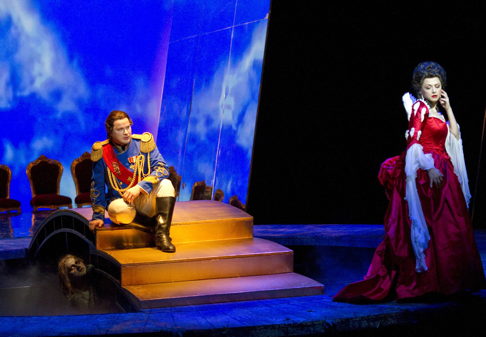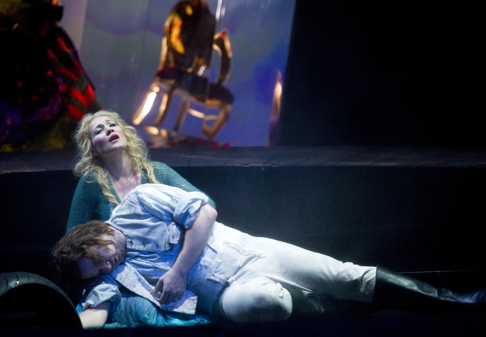![Barbara Haveman as Rusalka and Alexeï Tikhomirov as L'Ondin [Photo courtesy of Opéra Monte-Carlo]](http://www.operatoday.com/Rusalka_MC1.png)
03 Feb 2014
Rusalka in Monaco
Every-once-in-a-while a Rusalka comes along, and this week there are even two here on the French Riviera — just now in Monaco and upcoming Saturday on movie screens all along the coast.
English Touring Opera are delighted to announce a season of lyric monodramas to tour nationally from October to December. The season features music for solo singer and piano by Argento, Britten, Tippett and Shostakovich with a bold and inventive approach to making opera during social distancing.
This tenth of ten Live from London concerts was in fact a recorded live performance from California. It was no less enjoyable for that, and it was also uplifting to learn that this wasn’t in fact the ‘last’ LfL event that we will be able to enjoy, courtesy of VOCES8 and their fellow vocal ensembles (more below …).
Ever since Wigmore Hall announced their superb series of autumn concerts, all streamed live and available free of charge, I’d been looking forward to this song recital by Ian Bostridge and Imogen Cooper.
The Sixteen continues its exploration of Henry Purcell’s Welcome Songs for Charles II. As with Robert King’s pioneering Purcell series begun over thirty years ago for Hyperion, Harry Christophers is recording two Welcome Songs per disc.
Although Stile Antico’s programme article for their Live from London recital introduced their selection from the many treasures of the English Renaissance in the context of the theological debates and upheavals of the Tudor and Elizabethan years, their performance was more evocative of private chamber music than of public liturgy.
In February this year, Albanian soprano Ermonela Jaho made a highly lauded debut recital at Wigmore Hall - a concert which both celebrated Opera Rara’s 50th anniversary and honoured the career of the Italian soprano Rosina Storchio (1872-1945), the star of verismo who created the title roles in Leoncavallo’s La bohème and Zazà, Mascagni’s Lodoletta and Puccini’s Madama Butterfly.
Evidently, face masks don’t stifle appreciative “Bravo!”s. And, reducing audience numbers doesn’t lower the volume of such acclamations. For, the audience at Wigmore Hall gave soprano Elizabeth Llewellyn and pianist Simon Lepper a greatly deserved warm reception and hearty response following this lunchtime recital of late-Romantic song.
Collapsology. Or, perhaps we should use the French word ‘Collapsologie’ because this is a transdisciplinary idea pretty much advocated by a series of French theorists - and apparently, mostly French theorists. It in essence focuses on the imminent collapse of modern society and all its layers - a series of escalating crises on a global scale: environmental, economic, geopolitical, governmental; the list is extensive.
For this week’s Live from London vocal recital we moved from the home of VOCES8, St Anne and St Agnes in the City of London, to Kings Place, where The Sixteen - who have been associate artists at the venue for some time - presented a programme of music and words bound together by the theme of ‘reflection’.
'Such is your divine Disposation that both you excellently understand, and royally entertaine the Exercise of Musicke.’
Amongst an avalanche of new Mahler recordings appearing at the moment (Das Lied von der Erde seems to be the most favoured, with three) this 1991 Mahler Second from the 2nd Kassel MahlerFest is one of the more interesting releases.
‘And there was war in heaven: Michael and his angels fought against the dragon; and the dragon fought and his angels, And prevailed not; neither was their place found any more in heaven … that old serpent … Satan, which deceiveth the whole world: he was cast out into the earth, and his angels were cast out with him.’
If there is one myth, it seems believed by some people today, that probably needs shattering it is that post-war recordings or performances of Wagner operas were always of exceptional quality. This 1949 Hamburg Tristan und Isolde is one of those recordings - though quite who is to blame for its many problems takes quite some unearthing.
There was never any doubt that the fifth of the twelve Met Stars Live in Concert broadcasts was going to be a palpably intense and vivid event, as well as a musically stunning and theatrically enervating experience.
‘Love’ was the theme for this Live from London performance by Apollo5. Given the complexity and diversity of that human emotion, and Apollo5’s reputation for versatility and diverse repertoire, ranging from Renaissance choral music to jazz, from contemporary classical works to popular song, it was no surprise that their programme spanned 500 years and several musical styles.
The Academy of St Martin in the Fields have titled their autumn series of eight concerts - which are taking place at 5pm and 7.30pm on two Saturdays each month at their home venue in Trafalgar Square, and being filmed for streaming the following Thursday - ‘re:connect’.
The London Symphony Orchestra opened their Autumn 2020 season with a homage to Oliver Knussen, who died at the age of 66 in July 2018. The programme traced a national musical lineage through the twentieth century, from Britten to Knussen, on to Mark-Anthony Turnage, and entwining the LSO and Rattle too.
With the Live from London digital vocal festival entering the second half of the series, the festival’s host, VOCES8, returned to their home at St Annes and St Agnes in the City of London to present a sequence of ‘Choral Dances’ - vocal music inspired by dance, embracing diverse genres from the Renaissance madrigal to swing jazz.
Just a few unison string wriggles from the opening of Mozart’s overture to Le nozze di Figaro are enough to make any opera-lover perch on the edge of their seat, in excited anticipation of the drama in music to come, so there could be no other curtain-raiser for this Gala Concert at the Royal Opera House, the latest instalment from ‘their House’ to ‘our houses’.
"Before the ending of the day, creator of all things, we pray that, with your accustomed mercy, you may watch over us."
![Barbara Haveman as Rusalka and Alexeï Tikhomirov as L'Ondin [Photo courtesy of Opéra Monte-Carlo]](http://www.operatoday.com/Rusalka_MC1.png)
Every-once-in-a-while a Rusalka comes along, and this week there are even two here on the French Riviera — just now in Monaco and upcoming Saturday on movie screens all along the coast.
While invisible pulses of energy emanating from New York’s Lincoln Center will become huge shapes, bright colors and amplified sounds the Opéra Monte-Carlo’s Rusalka was vividly alive on the stage of one of the world’s most beautiful theaters, the Casino’s 500-seat jewel box, the Salle Garnier).
The renowned Orchestre Philharmonique de Monte-Carlo was in the pit in full force with notably splendid harp playing to evoke the splashes of water that were in fact quite real splashes of quite real water.
Stage director Dieter Kaegi created a contemporary story to frame the adolescent fairytale that is Dvorak’s last opera (of ten). During the overture two shapely bodies (male and female) on a motorcycle came upon a hidden pond. They shed their cloths (though strangely not all-the-way), dove in and did not reappear. It was of course a magic pond, so water sprites emerged — three stick-like marionettes (with three human operators) whose voices were three black-gowned singers standing downstage.
 Maxim Aksenov as the Prince and Tatiana Pavlovskaïa as the Foreign Princess [Photo courtesy of Opéra Monte-Carlo]
Maxim Aksenov as the Prince and Tatiana Pavlovskaïa as the Foreign Princess [Photo courtesy of Opéra Monte-Carlo]
More splashes of real water for the half-drowned appearance of the water god Ondin, father of the water sprite Rusalka who was not a marionette. Dressed in filmy light blue she was meant to be water itself so she never had to get actually wet. The romantically deluded Prince appears with his rifle to sing an impassioned love duet with Rusalka as he whisks her away to his palace, not forgetting to pick up the rifle he had put down when he embraced her.
Rusalka had had to negotiate with the witch Jezibaba to become human, the price was losing the ability to speak i.e. sing. Meanwhile the two shapely motorcycle bodies reappear to dance a pas de deux under the theater lights carefully focused by a stagehand who sang the role of the forester. A visiting princess points out that the prince is ignoring his guests. It is not certain if the prince falls in love with this princess even though he loves Rusalka above all else. Anyway, Rusalka thinks he has fallen in love with another.
All this gives rise to absolutely beautiful music, the Czech equivalent of an over-wrought Giordano, an uncanny amalgamation of Tchaikovsky’s on-your-sleeve emotions with Wagner’s subliminal emotional and philosophic impulses. There is a plethora of musical climaxes that offer frequent hints that the opera is about to end but it never does. It takes big voices to sail over the top of all this music.
The Opéra de Monte-Carlo took very good care of these needs. American conductor Lawrence Foster imposed the necessary sweep and importance to big music on a trivial subject. It was cleanly shaped, an approach that ignored a slavic pathos that might ignite such fateful tragedy. Dutch soprano Barbara Haveman brought big voice to Rusalka that she uses with high-level artistry, her “Měsíčku na nebi” was sensitively detailed with a felt intimacy in this actual context rather than as the usual concert aria. While Mme. Haveman did not find the youth and innocence in her voice that made her Monte-Carlo Jenufa (2007) memorable, she accomplished with sincere aplomb the miming of being water, and in fact distinguished herself as a total performer.
 Barbara Haveman as Rusalka and Maxim Aksenov as the Prince [Photo courtesy of Opéra Monte-Carlo]
Barbara Haveman as Rusalka and Maxim Aksenov as the Prince [Photo courtesy of Opéra Monte-Carlo]
Russian tenor Maxim Aksenov brought good looks, good high notes and an theatrical savoir faire that reveals his foundation in music theater and his grounding in the slavic repertory. Russian soprano Tatiana Pavlovskaïa added temperament, impassioned voice and very good singing to the Foreign Princess. Slimy costumed Russian bass Alexeï Tikhomirov, most often seen splashing in water or dripping water proved himself a willing performer who made the most of his role in this context. Polish mezzo-soprano Ewa Podles lustily sang the witch Jezibaba, naively directed as if she were the witch in Hansel and Gretel.
Director Kaegi completed the frame he created to enclose Dvorak’s opera by allowing his motorcycle couple to emerge from the pond during the final duet and delightedly photograph one another holding remnants of the fairytale still taking place — the Prince lay in the pond along with the now upended motorcycle and other detritus, dying his watery death in the arms of Rusalka who did not care.
Michael Milenski
Casts and production information:
Le Prince: Maxim Aksenov; La Princesse étrangère: Tatiana Pavlovskaïa; Rusalka: Barbara Haveman; L’Ondin: Alexei Tikhomirov; Jezibaba: Ewa Podles; Le Garde Forestier; Valdis Jansons; Le Marmiton: Julie Robard-Gendre; Première Nymphe; Daphné Touchais; Deuxième Nymphe: Marie Kalinine; Troisième Nymphe: Mayram Sokolova. Chœur de l'Opéra de Monte-Carlo; Orchestre Philharmonique de Monte-Carlo. Conductor: Lawrence Foster; Mise en scène: Dieter Kaegi; Décors et costumes: Francis O’Connor; Lumières: Olaf Lundt. Salle Ganier, Monte-Carlo, January 29, 2014.